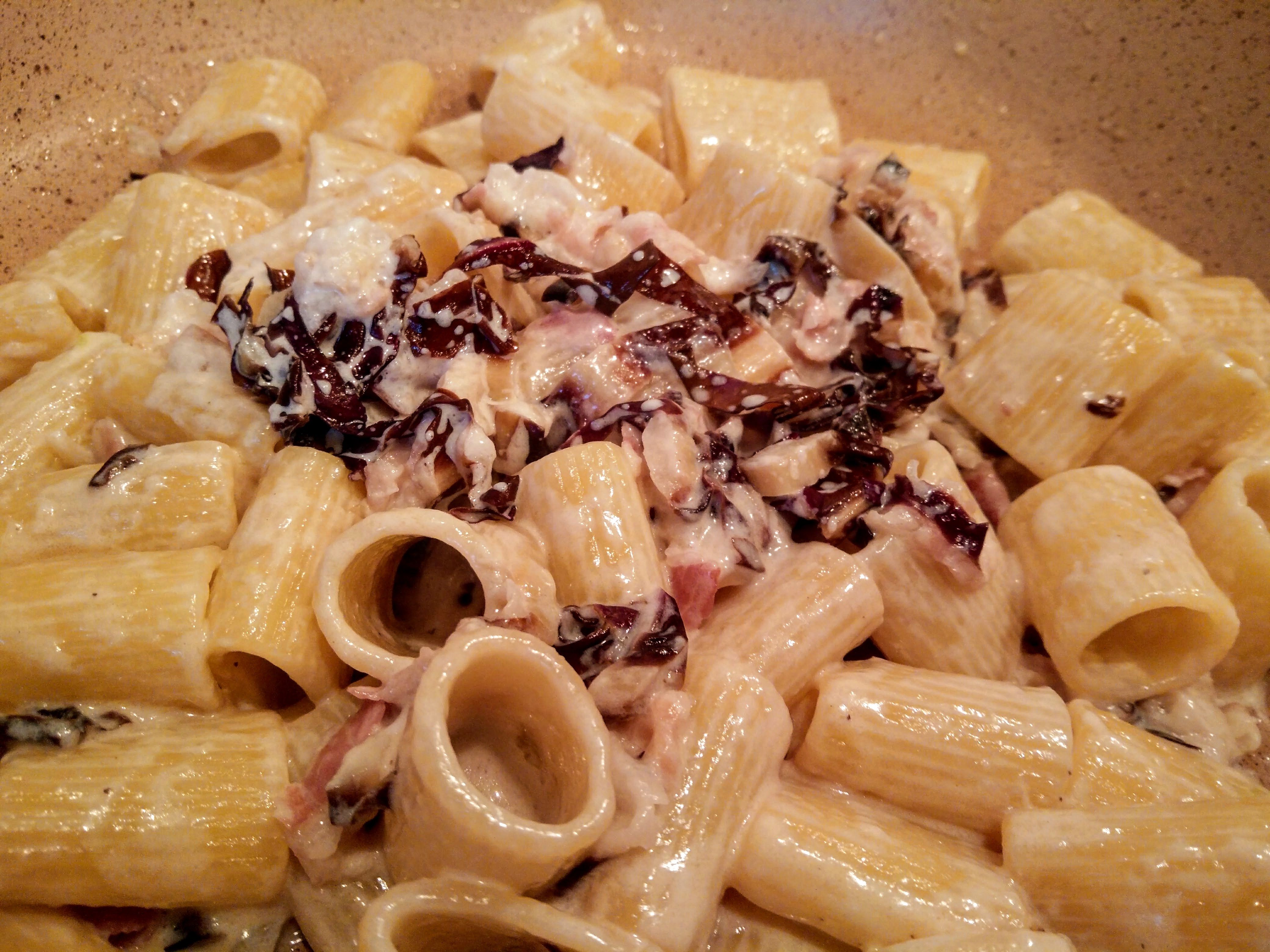Meet the ingredient #6: Chicory
It is important to know the properties of the ingredients we are using to cook. So, I decided to start this "Meet the ingredient" section and today I'll present Chicory.
Introduction
With the term chicory, in addition to the common chicory, scientific name Cichorium intybus, we identify a group of herbaceous plants. These plants can be annual, biennial, perennial and belong to the Asteraceae family.
The varieties of this type of salad are many. We have chicory with green or coloured leaves, types more suitable for salads and other suitable to be cooked. These species differ in the leaves shape and colour but the organoleptic and nutritional properties are very similar.

Image source

Image source
Properties
The main chicory properties are:
- Good for the heart: contains inulin, a form of dietary fibres that, according to recent studies, is able to reduce the levels of bad LDL cholesterol in the body. This type of cholesterol is one of the main causes of atherosclerosis and high blood pressure.
- Digestion: The presence of inulin makes chicory a salad useful to facilitate the digestive process. This salad also contains some antioxidant compounds and there are studies showing that chicory coffee can improve the quality of the blood.
- Anti-inflammatory: Studies have shown the anti-inflammatory properties of this plant. It is always thanks to the inulin that this salad brings benefits also in case of constipation.
- Anxiety: Chicory root extract has sedative properties. These positively affect anxiety and stress and help to calm the mood.
- Diuretic: used regularly for short periods of time, has diuretic properties that can help the body to get rid of toxins with benefits for liver and kidney.
- Oral Health: The chicory has antibacterial properties, especially in the root extracts used for the coffee. Its effects act against bacteria that are in the mouth, close to the teeth.
- Pimples and Acne: The plant is also useful for treating skin irritations and acne. A compress made with chicory decoction helps and relieves skin irritations.
Calories and nutritional values
100g of chicory contain 23 kcal, and:
- 92% water
- 1.5% proteins
- 3.9% dietary fibres
- 1.3% ashes
- 0.7% sugars
- 0.3% fats
Vitamins: vitamin A, B1, B2, B3, B5, B6, vitamin C, vitamin E, K and J. The chicory also contains beta-carotene, lutein and zeaxanthin.
Amino Acids: arginine, threonine, tryptophan, valine, leucine, histidine, isoleucine, phenylalanine and lysine
Contraindications
At the moment, if consumed in regular quantities, no particular contraindications have been identified, yet. The only warnings are for pregnant women who must refrain from eating chicory. In fact, this plant could have an emmenagogue and abortive effect.
Usages
Chicory is mostly used to make every kind of salads. However, it can also serve for other preparations, for example:
- to prepare pasta or rice sauces. For example Pasta Recipes #3: Mezze maniche with red chicory and bacon
- to prepare coffees. There are special powders made from chicory root extracts that allow us to prepare an energetic drink which can be considered an alternative to coffee.
- steamed chicory seasoned with oil and lemon
- roasted chicory root is also used by some brewers to improve the taste of beer

Curiosity
Finally, let’s see some curiosities and traditional folk beliefs:
- It has been cultivated for at least 5,000 years for its therapeutic properties and benefits.
- According to folk medicine, its lymph has the property of stimulating and improving the new breastfeeding mothers milk production.
- Galen of Pergamon, a Greek doctor who lived in the second century, defined this plant as a friend of the liver. Indeed, medical research has shown that chicory intake can increase bile production and can be useful in treating gallstones.
- Its slightly bitter taste is due to the presence of alkaloids.
- The popular tradition attributes to the chicory vasodilatory properties and therefore sexual activity stimulation.
Did you like the post? Please upvote, comment and follow!
NOTE: I put the image source after the first two images, since those ones are not mine.
You got an 100% upvote from @sourovafrin
Interesting post, thank you for sharing!
@OriginalWorks
@Steem-untalented
This post has received a 6.94 % upvote from @moneymatchgaming thanks to: @foodart. Upvote this Post to Support the MMG Community on Steemit! :)
This post has received a 11.63 % upvote from @voterunner thanks to: @foodart.
This post has received a 0.60 % upvote from @booster thanks to: @foodart.
This wonderful post has received a @foodart 6.46% upvote from @mrswhale. Discord Channel: https://discord.gg/WVJW7AC Please vote with the link below if you support our project. https://goo.gl/1zYDKh
You got a 20.00% upvote from @yourwhale courtesy of @foodart!
This post has received a 1.68 % upvote, thanks to: @foodart.
Sneaky Ninja Attack! You have been defended with a 0.93% vote... I was summoned by @foodart! I have done their bidding and now I will vanish...Whoosh
This post has received a 3.07 % upvote from @kittybot thanks to: @foodart.